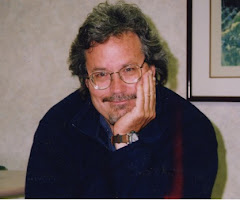
 Before my father passed away in 2005, he gave over to me the curatorship--he wouldn't have called it that--of my grandfather's sermons.
Before my father passed away in 2005, he gave over to me the curatorship--he wouldn't have called it that--of my grandfather's sermons.Grandpa Gee came over to America from England in the very early years of the last century--he began attending the University of Wisconsin in 1905, majoring in Philosophy. A tradition in our family has it that he wore a top-hat upon disembarking in the New World, not knowing that they were out of fashion here.
While at the university, he began his vocation as a Methodist pastor. This was a mentored vocation: no seminary was expected, available, or required. During the university years, upon a Sunday morning, he would ride the train to Mazomanie, Wisconsin, and conduct the service and preach the sermon in the tiny Methodist church in that sleepy river town. I do not know the content of his theological education, apart from the sermons that I have in my care. But the sermons have provided me with some important insights into my own father's understanding of what Christianity amounted to, and it has been with deeply mixed emotions that I have browsed through them.
The reason for this is the complete lack of the gospel. I have read in vain looking for Christ and salvation in his sermons. The occasional mention of Jesus is almost always in the context of his being a great teacher. But this has given me some insight into my own father's tendency to sum up his faith in the words, "What the hell. I've made mistakes. But I'm basically a good man." Grandpa's sermons have helped me to understand why Dad didn't really understand his faith until he was facing death and coming to realize that being a "good man" was an illusion, a disease for which there is a cure.
And so I read my grandfather's sermons with an historian's eye rather than a grandson's, at least most of the time. I need a little objective distance in my study of them. In the near future, I'll share some of his sermons with you.
There are a few hundred sermons in this collection. Each sermon is housed in an old, yellowing envelope. On the back of the envelope, Grandpa listed the sermon topic at the top, and then the location and date of the many times he gave that particular sermon. For example, under the title New Year's Sermon, Acts 19.21, are the following locations and dates (transcribed as clearly as I can read them):
- Whig Dec 31, 1910
- Elk Grove Jan 15, 1911
- Revised whig [?] E G Dec 29, 12
- Blue River }Basswood Feb. 7, 1915
- Cumberland Jan 2, '16
- Barron 12/28/19
- Glenwood City Jan 19, 21
- Mondovi Dec. 30, 1922
- Trempeleau-Centerville- 1.2.1943


3 comments:
Little known Wisconsin fact: if you're from Mazomanie, that makes you a Mazomaniac.
Cheesehed
"I have read in vain looking for Christ and salvation in his sermons. The occasional mention of Jesus is almost always in the context of his being a great teacher. But this has given me some insight into my own father's tendency to sum up his faith in the words, "What the hell. I've made mistakes. But I'm basically a good man." Grandpa's sermons have helped me to understand why Dad didn't really understand his faith until he was facing death and coming to realize that being a "good man" was an illusion, a disease for which there is a cure."
What a great tie-in of your grandfather's sermons with your father's faith. Please do write more.
These sermons were written during the Great Awakening, the temperance movement, World War One, and the depression. It will be interesting to see what comments your grandfather made on the social concerns of the day.
Post a Comment